

PM COURTS BAHRAINI INVESTORS WITH PAKISTAN’S SWEEPING ECONOMIC OVERHAUL BLUEPRINT

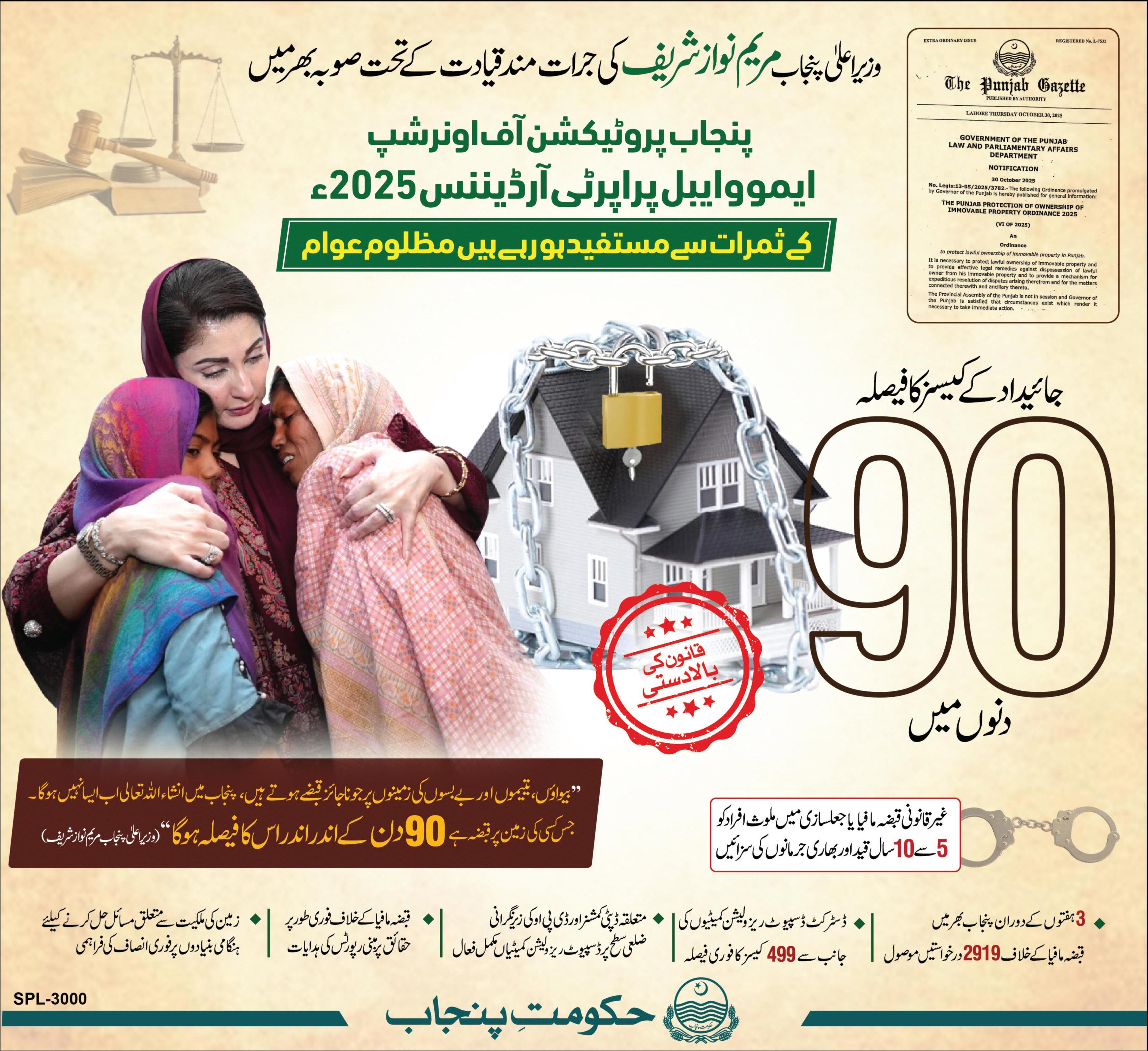

PBC CLOSES DIALOGUE ON






SINDH APPROVES PL AN TO SET UP 600 EV CHARGING STATIONS ACROSS

complete Pakistan expects the process to be finalised within the coming fortnight The update was shared during a recent meeting between the petroleum minister the OGDC chief and Munib Hussain a London-based
partner at international law firm Milbank which represents the project s financiers
The meeting also reviewed broader developments in Pakistan’s mining and oil and gas sectors, with participants expressing support for strategic investments and sectoral growth initiatives Pakistan has devised two execution plans for the project Under Plan A, the government and its partners are securing funding from lenders, while Plan B involves continuing operational activity regardless of the timing of financial close Machinery has already been deployed at the site and construction work is underway The formal signing ceremony is scheduled for January Pakistan’s mineral sector, despite its extensive resource base currently contributes about 3 2% to GDP with mineral exports accounting for only 0 1% of global trade The country spans an outcrop area of 600,000 square kilometres and holds 92 known
minerals 52 of which are commercially exploited The sector produces an estimated 68 52 million metric tons annually, supporting over 5,000 mines and 50,000 SMEs and providing employment to roughly 300 000 people Located in Balochistan s Chagai district the Reko Diq mine contains one of the world s largest undeveloped copper and gold deposits The project, operated and revived by Canada’s Barrick Gold, is expected to begin production in 2028 with an initial investment of $5 5 billion Barrick CEO Mark Bristow has previously said the project is estimated to
forecast to
$2 8 billion while thousands of direct and indirect jobs are expected to be created A planned second phase aims to lift copper output to 400,000 tonnes and gold production to 500,000 ounces per year


TH E Israeli security forces have launched a new operation in the Tubas Governorate raising the suspicion that the Netanyahu government is not just far from a two-state solution but is working on the Greater Israel plan which involves expelling or massacring all Palestinians still in the Occupied Territories Israel has faced a check in Gaza where Palestinians have refused to simply line up and get killed and Israel has turned its attention to the West Bank There unlike Hamas in the Gaza Strip it has received more cooperation from the Palestinian Authority ruling party Al-Fatah but it has been engaged in an operation that started in January in Jenin where it seems the Islamist resistance is concentrated Though the situation in the West Bank is far from the sort of disruption and destruction in the Gaza Strip there has been a resumption of building new settlements and settlers have become more aggressive
The expansion of the operation in the West Bank is an indication of why Israel agreed to a ceasefire in the Gaza Strip It also shows that like Hitler Israel cannot be appeased It has hardly been implementing the ceasefire in the Gaza Strip feeling free to bomb whenever it sees fit US President Donald Trump was quick enough to put his name to the Gaza Peace Plan but has shown little enthusiasm for ensuring that its terms are being met In short as predicted at the moment of signing he has fallen in with Israeli wishes Israel has not fulfilled one of the basic purposes of the ceasefire to reopen an aid route for a Gazan populace which was literally starving The Peace Plan failed to bring peace to the Middle East and the renewed operation in the West Bank merely shows that its peace is disturbed by the presence of Israel of the continuing illegal occupation of Palestine The need felt by Israel for what is being described as


FO R four
to
since returning to power in August 2021 has proven the opposite Far from fulfilling the promises laid out in written agreements such as the 2020 Doha Accord and the 2024 Pakistan–UAE–Afghanistan trilateral arrangement the Taliban have repeatedly violated their obligations while reaping political concessions, financial inflows, and diplomatic space Today, Afghanistan is no longer merely unstable; it is a revived hub for transnational jihadism The world can no longer afford to look away The Doha Agreement s first requirement was clear: The Taliban would enter intra-Afghan dialogue to negotiate a political settlement with the then-government in Kabul In return, 5,000 Taliban prisoners were released on the condition that they would not rejoin militancy What followed was a straightforward betrayal Instead of sitting across the table from the Ashraf Ghani administration the Taliban escalated their offensive and a significant number of the released prisoners returned immediately to the battlefield The result was not political compromise but the violent takeover of Kabul in August 2021 Taliban 2 0 promised inclusivity and moderation What Afghanistan received instead was an exclusionary hardline emirate that mirrors the obscurantist rule of the 1990s Women and girls were banned from secondary and higher education, barred from most workplaces, and erased from public life Ethnic minorities Tajiks, Uzbeks, Hazaras, and others remain structurally marginalized Afghanistan is home to 14 major ethnic groups yet the Taliban regime is almost entirely Pashtun in composition In a 49-member cabinet only a handful of Tajiks, Uzbeks, Baloch, or Nuristanis are present; every key ministry is held by Pashtuns aligned with the Kandahar Shura The leadership is composed almost exclusively of former Taliban commanders not technocrats or representatives of Afghanistan s diverse society The Taliban promised change but inequality and repression remain cornerstones of their rule The second major plank of the Doha Agreement was even clearer: The Taliban would never again allow Afghan soil to be used to threaten other countries Instead Afghanistan has regressed into a sanctuary for global jihadist groups The killing of Ayman al-Zawahiri in Kabul in August 2022 one year after the Taliban assumed power was the first unmistak-
T r y i n g
TH E federal government has convened on December 7 the inaugural meeting of the National Finance Commission with that meeting intended to begin a process which is supposed to last for five years but which may well last for much longer The present NFC is supposed to make the first Award since 2010 The missed Awards are 2015 and 2020, with an Award due in 2025 The Award which should be in force at the moment should have been halfway through its life
Though Martial Laws are more disruptive of NFC Awards elected governments have hardly covered themselves with glory One result is that not a single Award has been made on time, even though the Constitution’s timeframe is clear enough This is because one or other province has prevented a consensus being formed with the result that Awards are not enacted It could be noticed that NFCs were constituted in 1979 (when the First Award expired) and then five years later in 1984 but on neither occasion was an Award enacted The existing Award was renewed, a formula thus being found to overcome the difficulty This use of Article 160, which says that nothing shall be illegal just because it was not done on time has been extensive
The failure of the NFCs constituted in 1980 and 1985 to prepare Awards which could be enacted was succeeded by two PM, Muhammad Khan Junejo and then Benazir Bhutto, who did not address the issue at all It was not till 1991 that Mian Nawaz Sharif constituted an NFC, whose Award was enacted, thus giving the country an Award for the first time in 17 years
The next Award was due in 1996 but was delayed by a year In 2002 under the Musharraf Martial Law an NFC was constituted but no Award made That had to wait until 2010
However, since then, even though there have been political governments in office This is the first time an NFC has been constituted This indicates that an NFC Award is not high on the list of government priorities probably because it is well to let sleeping dogs lie and also because not much is going to be solved Second, there was no path to an Award As the Award needs consensus, it means that any one province can stop its being made by a simple refusal That meant that while the PTI was in power in KP, the PML(N) had no hope of getting an Award though
When the PTI took office at the Centre the PPP s Sindh government provided a bulwark against consensus It seems there is a repeat of the 2014 situation where the PTI can block consensus It probably will, holding the release of imprisoned party founder Imran Khan an essential condition for KP’s consent His release or otherwise seems to have nothing to do with an NFC Award but the new KP CM is more of an Imran fan than his predecessor However there is the factor that Prime Minister Shehbaz Sharif back in 2009, became the first CM to form part of the con-
able sign Repeated assessments by analysts and former intelligence officials indicate that senior al-Qaeda figures, including Saif al-Adl and Hamza bin Laden have been sheltered in Kabul Multiple credible international reports reinforce this pattern UN monitoring teams in 2025 detailed al-Qaeda s efforts to reorganize in Afghanistan rebuild networks and reactivate sleeper cells abroad The General Directorate of Intelligence (GDI) the Taliban’s intelligence arm has been implicated in providing safe houses movement passes and weapon permits to Tehrik-e-Taliban Pakistan leaders Estimates suggest 6 000–6 500 TTP fighters and a dozen senior al-Qaeda operatives are present in Afghanistan The Taliban s continued tolerance indeed facilitation of these groups directly threatens Pakistan and the wider region Pakistan has borne the brunt of this failure Despite signing a trilateral agreement with Pakistan and the UAE in 2024 which included commitments to relocate TTP militants away from the border the Taliban delivered only symbolic compliance A few hundred fighters were moved, with no transparency or monitoring mechanism Some of the funds designated for relocation reportedly ended up bolstering extremist groups under the guise of refugee assistance Despite enormous diplomatic outreach four visits by Pakistan s Foreign Minister multiple missions by senior defense officials, hundreds of flag meetings, démarches, and protest notes the Taliban have refused to sever ties with militant groups that target Pakistan Instead the flow of NATO weapons worth an estimated $7 billion abandoned during the U S withdrawal has strengthened the TTP and other anti-Pakistan proxies The Taliban s behaviour is not just a regional problem; it is a global one In recent
sensus for an NFC Award even though his party was in the opposition in the Centre Only if Sohail Afridi can follow that example will an Award be possible
Apart from party politics there are disputes looming over both the vertical and horizontal splits both of which are determined by the NFC Once it is decided which federal taxes are to be placed in the federal divisible pool, it is then decided how that pool should be split between the federal governments Then comes the horizontal split which is between the provinces
This is the first NFC which will involve a debate on both the vertical and horizontal splits The federal provincial split now stands at 57 5 percent It has been calculated that the federal debt servicing, salary and administration burden may soon be next only by borrowing, unless the federation keeps more of the taxes it makes The natural step is for the federal government to demand that the divisible pool be reduced It would mean a reduction in the provincial share something which will be strenuously resisted by all provinces, and it would need only one to refuse consent for there to be no Award
The horizontal split has also been hotly debated in the past and one of the achievements of the last Award was to move away from the population basis
Population was not abandoned entirely and was given 82 percent weightage Federal ministers have expressed reservations about population, which makes it likely that it will try to further reduce its weightage There are two issues which the federation is likely to take up, which had been agreed at the last NFC but which have not been implemented The first was the setting up of Provincial Finance Commissions which were supposed to divide the provincial budgets between the provinces and the local governments, and then the local governments were supposed to divide their share among themselves This was not operationalized, primarily because the provincial governments did not like the loss of control it meant The provinces are also likely to face awkward questions about service delivery The provinces have to deliver health and education Indeed interwoven is the
e r n m e n t s s hy a w ay, bu t t h e b a s i c p ro b l e m h a s n o t b e e n
s o l v e d : t h e c o u n t r y i s p o o r I f t h e c o u n t r y w a s r i c h e r, a n d t h e
f e d e r a l c o l l e c t i o n s g r e a t e r, t h e f e d e r a l d i v i s i b l e p o o l wo u l d b e
e n o u g h fo r b o t h f e d e r a l a n d p rov i n c i a l n e e d s . H o w e v e r, t h e N F C i s n o t a l l o w e d t o i n d u l g e i n w i s h - f u l f i l l i n g f a n t a s y
months, Russia, China, Iran, Central Asian states, the UN, the SCO, and even the Collective Security Treaty Organization have issued stern warnings Their assessments are unambiguous: Afghanistan has become the central incubator of transnational terrorism From ISIS-Khorasan training camps to al-Qaeda networks and TTP staging posts the country is once again a launchpad for violence far beyond its borders These concerns are not political accusations ” They are formal statements from major powers and international organizations The Taliban have violated their commitments under the Doha Agreement and subsequent promises to regional states They have taken financial assistance $80 million per month from the USA at one point, additional funding from UN agencies, and relocation support from UAE without altering their conduct
The world must now accept what is evident: The Taliban have no intention of fulfilling their promises Their regime remains ideologically rigid internationally duplicitous and regionally destabilizing
The international community must move past hopeful rhetoric and adopt a policy anchored in accountability If the Taliban continue to provide sanctuary to terrorist groups violate human rights and undermine regional stability punitive measures must follow including targeted sanctions, diplomatic isolation, and restrictions on financial flows that prop up their regime A stable Afghanistan is in everyone’s interest But stability cannot be built on deception The time for wishful thinking is over; the Taliban must finally be held responsible for the promises they have broken
The writer can be reached at asadmalik2008@gmail com
The international community must move past hopeful rhetoric and adopt a policy anchored in accountability If the Taliban continue to provide sanctuar y to terrorist groups, violate human rights, and undermine regional stability, punitive measures must follow including targ eted sanctions, diplomatic isolation, and restrictions on financial flows that prop up their regime . A stable Afghanistan is in ever yoneÊs interest. But stability cannot be built on deception. The time for wishful thinking is over; the Taliban must finally be held responsible for the promises they have broken.
AsAd AlI
between personal belief and institutional role On National Unity Day in 2025, the Chief of Army Staff, iGen Upendra Dwivedi,n full uniform, received a traditional tilak and garland from Hindu priests during a public ceremony Defenders may dismiss this as harmless culture yet in a deeply diverse multi-faith society such overt privileging of one religion by the top brass erodes the perception of neutrality When the highest-ranking soldier openly participates in explicitly Hindu rituals in uniform it sends a clear message down the chain of command: Hindu ritualism is not just accepted it is endorsed as part of institutional culture
The boundary between private faith and public duty was pushed even further in May 2025 when the COAS paid a high-profile visit, again in uniform, to the ashram of Hindu spiritual leader Jagadguru Rambhadracharya in Chitrakoot Madhya Pradesh This was not a quiet off-duty pilgrimage; it was a spectacle The spiritual leader later claimed to have given the COAS diksha religious initiation, likened to Lord Hanuman’s initiation in Hindu tradition and in return publicly asked him to “reclaim Azad Jammu and Kashmir as dakshina ” a religious offering In that single tableau General Dwivedi was symbolically recast not as a neutral constitutional officer of a secular republic, but as a disciple bound by a spiritual obligation bestowed by a religious preceptor It is hard to imagine a more direct breach of the invisible wall that should separate the temple from the barracks
Even the naming conventions of military operations now mirror this ideological turn Traditionally, Indian military operations were given neutral or technical labels Under the current dispensation, however, operations are increasingly christened with explicitly Hindu religious terms with “Sindoor” and Mahadev being emblematic examples
Names are never just labels; they are semiotic choices that shape internal culture and
external messaging By invoking Hindu religious vocabulary in military operations, the institution is, wittingly or unwittingly, recasting itself as the armed wing of a Hindu nationalist project When this trend is coupled with bellicose statements by senior officers that echo ruling-party talking points and hardline rhetoric including open threats and boastful references to Hindutva ideals the distinction between a professional military and a partisan instrument of power becomes perilously thin
Structural and institutional shifts add another layer of concern The Agnipath recruitment scheme introduced in 2022 has altered the demographic and cultural pipeline feeding the armed forces While officially justified on grounds of efficiency, youthfulness, and budgetary prudence, credible reports suggest that a significant proportion of new recruits are connected ideologically or organizationally to Hindu nationalist ecosystems such as the RSS and its affiliates When large inflows of young soldiers are drawn from pools already steeped in Hindutva narratives, the long-term impact on military culture is not hard to foresee It risks creating an echo chamber in which majoritarian nationalism is treated as common sense rather than as a contested political ideology Sainik Schools long considered incubators for future officers are undergoing a similarly consequential re-engineering These institutions, crucial in shaping the mindset and values of prospective officers are increasingly influenced by organizations close to the Hindu nationalist network including Vidya Bharati and groups tied to the Ram Mandir movement Curricular and extracurricular activities that foreground a Hindu civilizational narrative over a secular, pluralist ethos risk grooming a generation of officers whose primary loyalty may tilt toward ideological majoritarianism rather than the constitutional framework If the well is poisoned at the source, the water down-

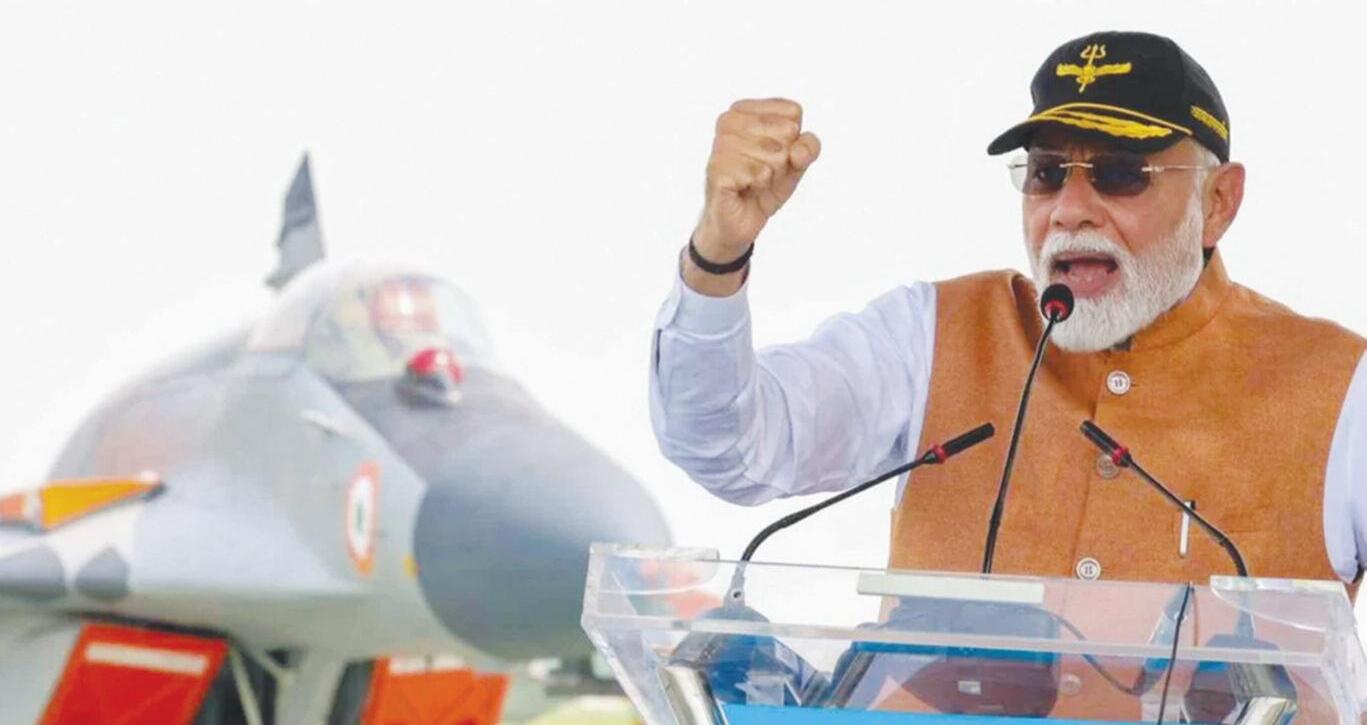
stream cannot remain pure Cultural and symbolic shifts of this kind carry very real human consequences particularly for minority officers and soldiers Reports have surfaced of systemic pressure on Sikh, Muslim, and Christian officers to participate in Hindu rituals or at the very least remain conspicuously silent when such rituals dominate official functions A stark example is the case of Lt Samuel Kamalesan a Christian officer dismissed in 2025 for
The same pattern is visible along India’s tense frontiers In December 2024 the Fire and Fury Corps unveiled a statue of the 17th-century Maratha ruler Shivaji near Pangong Tso in Ladakh flanked by a saffron flag Pangong Tso is a strategically sensitive border region; installing a saffron-framed emblem of Hindu martial glory there is far more than an exercise in heritage pride It is a loud political and ideological signal aimed simultaneously at domestic audiences and external rivals Rather than projecting a secular pan-Indian military identity, the institution appears increasingly comfortable wrapping its strategic posture in Hindutva-inflected iconography Religious rituals involving senior military leadership have further blurred the line
By binding the militaryÊs identity to a partisan religious project, India risks undermining the very pillars of cohesion, professionalism, and legitimacy on which any modern armed force must rest In the attempt to recast the Indian military as „Modi ki Sena,‰ the political leadership may reap short-term applause from its core constituency, but it is, in effect, playing with fire When the gun and the saffron flag are symbolically welded together, the consequences reach far beyond momentary political gain It is not only minorities or the wider region that have cause for concern; it is the long-term stability, institutional integrity, and constitutional balance of the Indian state itself that ultimately hang in the balance
Israeli normalization with Saudi Arabia is desirable but
Many were anticipating whether Mohammed bin S alman’s trip to Washington would lead to S audi Arabia joining the Abraham Accords, but it wasn’t to be
as an immovable obstacle, Israel deserves the same deference when it points to its own public’s deep broad opposition to a Palestinian state
TH E tantalizing prospect of normalization with Saudi Arabia is something various US officials – including US President Donald Trump – have dangled before Israeli eyes for months The idea was that after the Gaza war ended and after Washington re-engaged energetically in the region Riyadh would finally take the fateful step and join the Abraham Accords That mirage flickered again last week when Saudi Crown Prince Mohammed bin Salman (MBS) arrived in Washington for a lavish White House reception that provided the perfect backdrop for the announcement of a historic breakthrough It wasn’t
CREATION OF A PALESTINIAN STATE
SEEN AS A THREAT TO ISRAEL: A Palestinian state may sound nice on paper, but in Israel’s post-October 7 reality, it is widely seen as an existential threat Normalization with Saudi Arabia has clear strategic economic and symbolic value but not at the price of abandoning Israel s core security doctrine or ignoring the hard lessons learned over the past two years There is another uncomfortable truth beneath last week’s spectacle Saudi Arabia walked away with a great deal simply by showing up in Washington: public rehabilitation after years of being treated as untouchable; movement toward nuclear cooperation; the prospect of eventually acquiring fifth-generation American fighter planes; and the designation as a major non-NATO US ally All of this came without Riyadh taking a single meaningful step toward Israel Much of this reflects Washington s desire to anchor Riyadh firmly in the American orbit at a time when global competition with China has become a defining strategic priority This broader context is sobering for Israel Saudi Arabia today has options including dancing with Beijing and Moscow and is using those suitors to negotiate with the US from a position of strength MBS can afford to be patient He can say not yet to normalization and can make no meaningful gestures
of this downward spiral is remarks by Prime Minister Sanae Takaichi that acknowledged the importance of a Taiwan crisis to Japan s national security Her statement of the obvious infuriated China prompting Beijing to take a series of steps to punish Japan China has again resorted to economic coercion, part of a well-rehearsed diplomatic playbook China seeks to intimidate Japan and encourage it to distance itself from Taiwan The Japanese government must not bend Taiwan is central to Japanese national security China must learn that it cannot cow this nation or others and force them to put Chinese interests above their own The rupture in relations with China began earlier this month when Prime Minister Takaichi told a parliament session that a Chinese attack on Taiwan could constitute a “survival-threatening situation” for Japan and would thus oblige the government to exercise its right to collective self-defense That comment followed the prime minister s meeting with Lin Hsin-I a former vice premier of Taiwan at the APEC leaders meeting in South Korea, a show of respect that pricked Chinese sensitivities When her Diet remarks were questioned by opposition lawmakers, Takaichi repeated them, insisting that they were “consistent with the government’s longstanding position,” although she later conceded that they were based on a worst-case assumption and that any future decision would be based on actual circumstances and not a hypothetical China reacted with fury as it reasons that Taiwan is a renegade province that is destined to be reunited with the mainland Any actions that might forestall that future and the implication of Takaichi’s remark is that Japan would assist the United States in efforts to defend Taiwan from attack are anathema to China China s consul general to Osaka reacted with an appalling and offensive post on social media that seemed to call for violence against the prime minister Tokyo lodged a protest with Beijing over the post while Chief Cabinet Secretary Minoru Kihara called it extremely inappropriate and demanded that it be deleted It has since disappeared
China’s Foreign Ministry then denounced Takaichi’s comments calling them “gross interference in China’s internal affairs Japan s ambassador to China Kenji Kanasugi was summoned to China s Foreign Ministry to hear a complaint That is all standard diplomatic procedure China then resorted to economic coercion to show its displeasure First, the Chinese government announced that it would reimpose a ban on the import of Japanese fishery products China had prohibited the import of those items in 2023 following Tokyo s decision against Beijing s wishes to discharge treated wastewater from the Fukushima No 1 nuclear power plant where reactors melted down following the March 2011 triple catastrophe China claimed that the discharge would pollute local fish and seafood products, even though international inspectors gave the project a green light At first Chinese officials blamed Japan for failing to provide technical materials it had promised about the testing of the seafood imports but they added that Takaichi
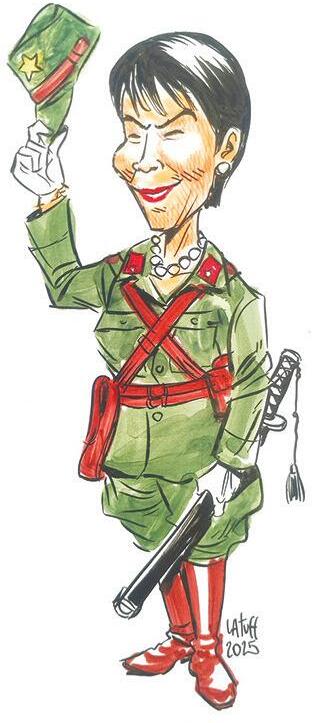
‘Modi ki Sena’
Tariq Khan Tareen





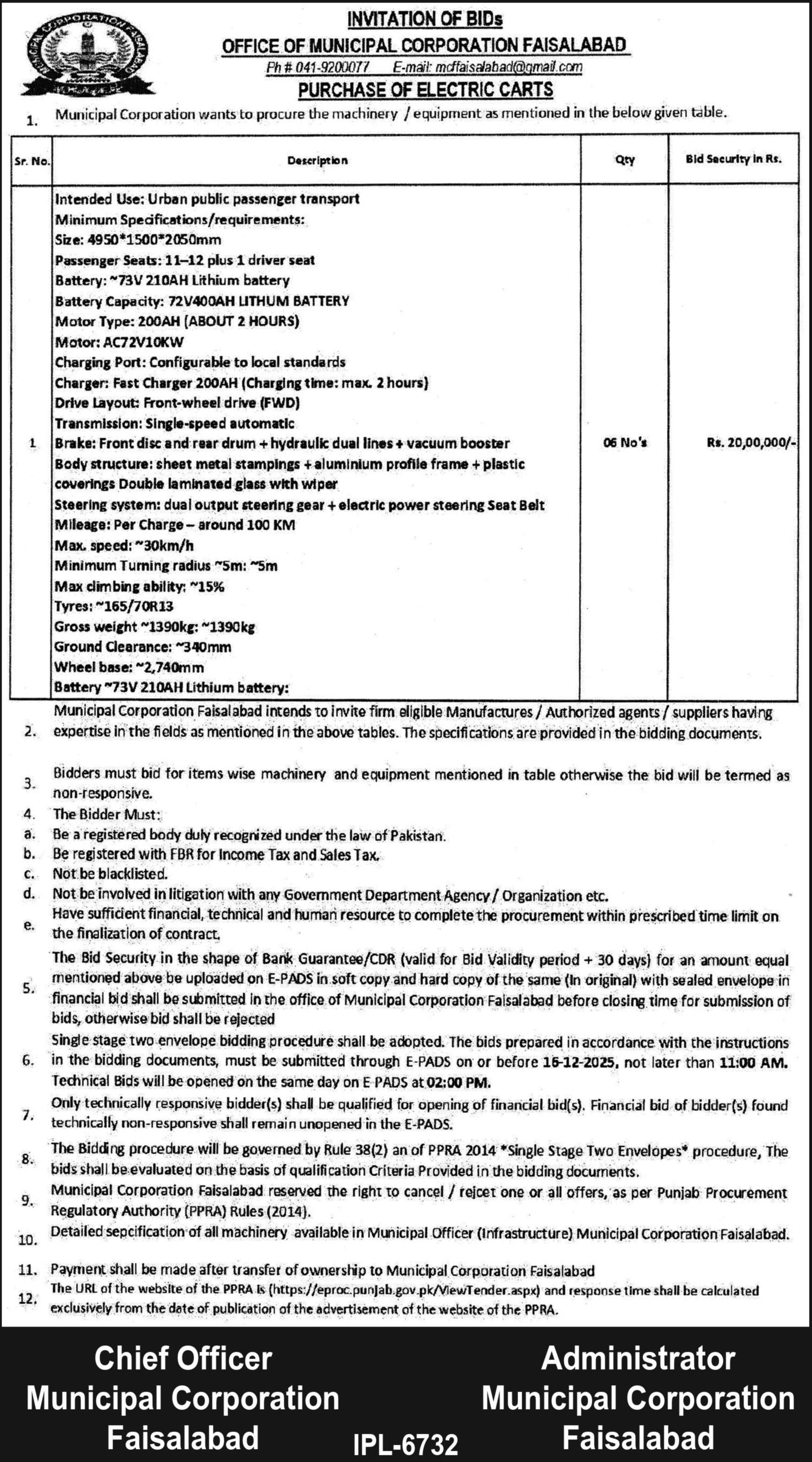

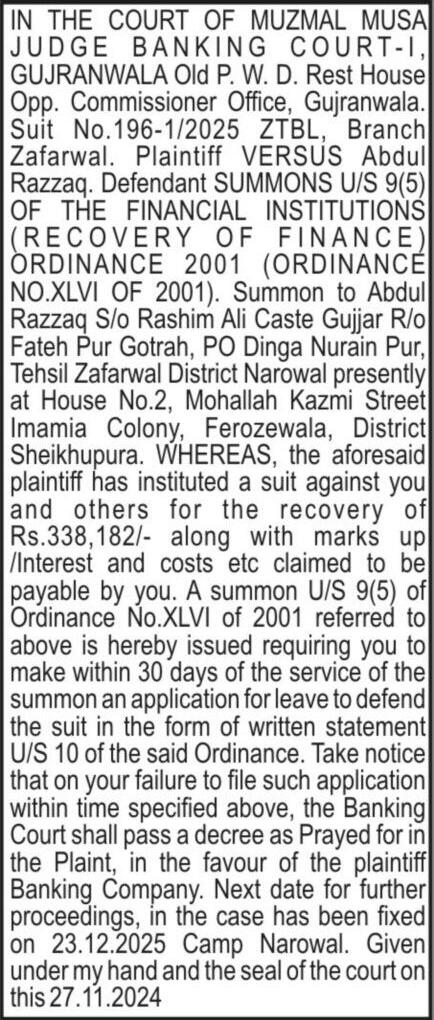

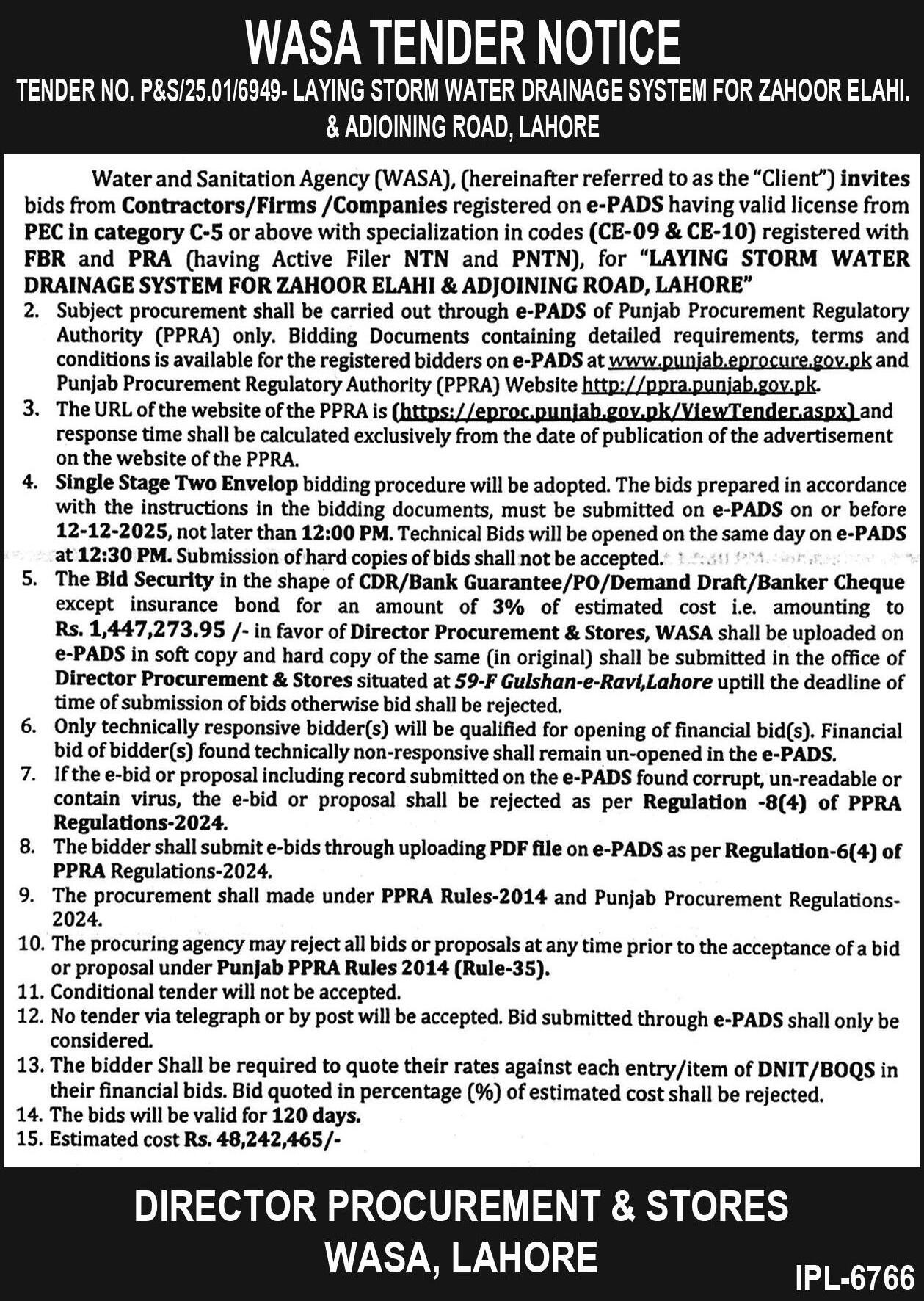

CM SEEKS DAILY ACTION REPORTS, WARNS DCS


Iqbal from Daily Jang also lauded the achievements of Dr Asif Mahmood

plished under the leadership of Dr Asif Mahmood Jah, Hilal-e-Imtiaz, Sitara-e-Imtiaz The session was conducted by Abdul Basit Khan Advisor Media FTO Lahore who presented key aspects of institutional progress during the past four years Business Community Reaffirms Confidence in FTO Prominent members of the media and business community attended the briefing Founding member of the Sheikhupura Chamber of Commerce and leading business personality, Mr Manzoor-ul-Haq, praised the vision of Dr Asif Mahmood Jah and stated that the Federal Tax Ombudsman stands as the most effective and accessible ombudsman institution in Pakistan He commended the FTO model for providing swift, transparent, and inexpensive justice to traders and taxpayers Renowned cartoonist Javed






Pahalgam incident
Analysts quoted by
also
The
darity with
of
tremism and respect the shared heritage of the Indus civilisation Lawmakers highlighted that Sindh s identity is rooted in an ancient cultural and political consciousness predating modern nation states The resolution recalled that Sindh separated from the Bombay Presidency in 1936 demonstrating a clear will for self governance, and that the province became the first to adopt a resolution supporting the creation of Pakistan Members said these decisions underscored Sindh’s historic role in shaping the federation The assembly described the Indian minister s comments as
historically baseless and politically provocative, arguing that they reflected a wider attempt to destabilise the region Legislators said the people of Sindh and Pakistan rejected such claims and recognised the Indus River as a shared civilisational lifeline rather than a tool for political pressure
Speaking during the session Sindh Chief Minister Murad Ali Shah criticised Singh s remarks and urged the federal government to raise the matter at the international level He said the resolution should be conveyed to global institutions to highlight what he termed India’s aggressive posture toward the river system Murad reiterated that Sindh s boundaries could not be altered and said the province s loyalty to Pakistan was unquestionable He emphasised Sindh’s ancient history, pointing out that its roots extended before the Common Era and noting that regions such as Multan and Makran had long been part of historic Sindh
The chief minister accused the Indian government of attempting to weaponise water and suggested that Singh’s comments reflected political anxiety rather than historical fact The assembly subsequently approved the resolution without dissent


